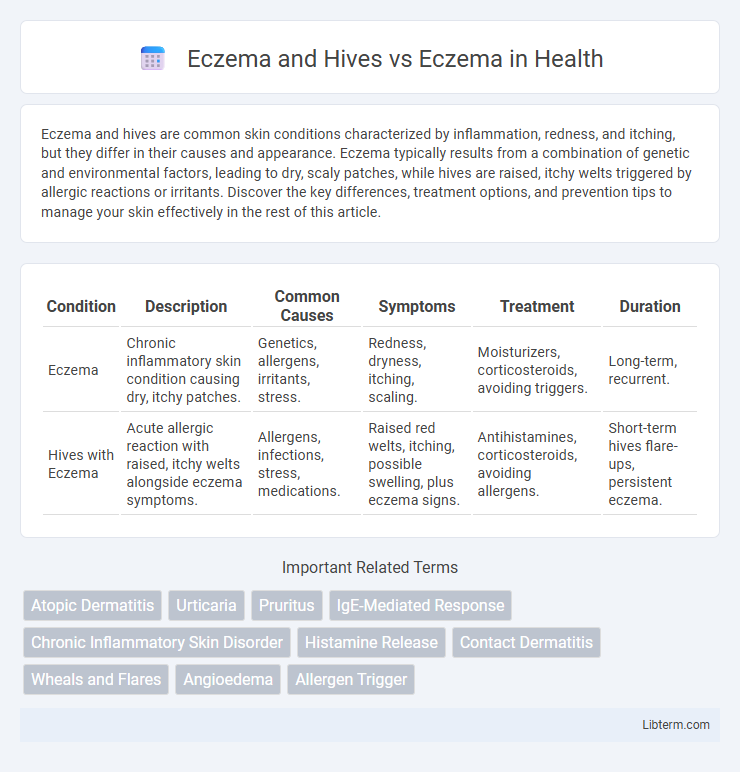Eczema and hives are common skin conditions characterized by inflammation, redness, and itching, but they differ in their causes and appearance. Eczema typically results from a combination of genetic and environmental factors, leading to dry, scaly patches, while hives are raised, itchy welts triggered by allergic reactions or irritants. Discover the key differences, treatment options, and prevention tips to manage your skin effectively in the rest of this article.
Table of Comparison
| Condition | Description | Common Causes | Symptoms | Treatment | Duration |
|---|---|---|---|---|---|
| Eczema | Chronic inflammatory skin condition causing dry, itchy patches. | Genetics, allergens, irritants, stress. | Redness, dryness, itching, scaling. | Moisturizers, corticosteroids, avoiding triggers. | Long-term, recurrent. |
| Hives with Eczema | Acute allergic reaction with raised, itchy welts alongside eczema symptoms. | Allergens, infections, stress, medications. | Raised red welts, itching, possible swelling, plus eczema signs. | Antihistamines, corticosteroids, avoiding allergens. | Short-term hives flare-ups, persistent eczema. |
Understanding Eczema: Causes and Symptoms
Eczema, a chronic inflammatory skin condition, is characterized by dry, itchy, and red patches caused by genetic and environmental factors like allergens and irritants. Unlike eczema combined with hives, which includes raised, itchy welts triggered by allergic reactions, eczema alone primarily results from immune system dysfunction and skin barrier defects. Recognizing symptoms such as persistent itching, scaling, and inflammation helps differentiate eczema from acute hives outbreaks, aiding targeted treatment strategies.
What Are Hives? Key Differences from Eczema
Hives, medically known as urticaria, are raised, itchy welts caused by an allergic reaction, often appearing suddenly and fading within 24 hours, whereas eczema is a chronic inflammatory skin condition marked by dry, scaly, and itchy patches. Unlike eczema, hives typically result from histamine release triggered by allergens such as foods, medications, or insect stings, while eczema is often linked to genetic factors and immune system dysfunction. The key difference lies in hives' transient, fluid-filled appearance versus eczema's persistent, thickened, and cracked skin lesions.
Eczema vs. Hives: How to Tell Them Apart
Eczema and hives are both skin conditions characterized by redness and itching but differ in triggers and appearance. Eczema, often chronic, presents as dry, scaly patches and is linked to genetic and environmental factors, whereas hives appear as sudden, raised welts caused by allergic reactions or irritants. Identifying eczema versus hives relies on understanding symptom duration, with eczema persisting longer and hives typically resolving within 24 hours.
Common Triggers for Eczema and Hives
Common triggers for eczema include allergens such as dust mites, pet dander, and pollen, as well as irritants like soaps, detergents, and harsh fabrics. Hives are often triggered by factors such as food allergies, insect stings, medications, and temperature extremes. Both conditions can be exacerbated by stress, but eczema tends to flare due to chronic skin barrier issues, while hives result from an acute allergic reaction causing raised, itchy welts.
Appearance: Visual Differences Between Eczema and Hives
Eczema typically presents as dry, scaly patches with redness and thickened skin, often accompanied by intense itching and chronic inflammation. Hives appear as raised, red or skin-colored welts or bumps that can rapidly change shape and size, usually with a sudden onset and fading within 24 hours. Unlike eczema's persistent patches, hives are transient, often with a distinctive swollen and itchy texture that distinguishes them visually.
Itchiness: Eczema and Hives Compared
Eczema and hives both cause significant itchiness, but the underlying triggers and duration differ. Eczema itchiness is chronic, often linked to skin barrier dysfunction and inflammation, while hives itchiness is usually acute, triggered by allergic reactions causing raised, red welts. Effective treatment requires understanding these distinctions to target the specific causes of itch in each condition.
Diagnosis: Identifying Eczema, Hives, or Both
Diagnosing eczema and hives requires careful evaluation of clinical features, with eczema presenting as chronic, dry, itchy skin patches and hives manifesting as transient, raised, red welts or wheals. Skin tests and patient history help distinguish between atopic eczema and urticaria, as both can coexist in some patients, complicating diagnosis. Accurate identification influences treatment plans, emphasizing the need for dermatologists to use symptom duration, lesion appearance, and triggers in diagnosis.
Treatment Options: Managing Eczema vs. Hives
Managing eczema typically involves the use of moisturizing creams, topical corticosteroids, and avoiding irritants to prevent flare-ups, while hives treatment focuses on antihistamines to reduce allergic reactions and inflammation. Both conditions may require prescription medications for severe cases, but eczema often necessitates long-term skin barrier repair strategies. Understanding the distinct triggers and symptoms is crucial for effective treatment and preventing recurrence.
Long-Term Management Strategies
Long-term management of eczema and hives requires tailored approaches addressing their distinct triggers and symptoms. Eczema management emphasizes consistent skin hydration, identification of irritants, and the use of topical corticosteroids or calcineurin inhibitors to reduce inflammation. In contrast, chronic hives management focuses on antihistamines to control itching and swelling, alongside lifestyle adjustments to avoid allergens and stressors that precipitate flare-ups.
When to Seek Medical Advice: Warning Signs
Persistent eczema accompanied by severe itching, swelling, or signs of infection such as pus, increased redness, or warmth requires prompt medical evaluation. Hives that suddenly spread, cause difficulty breathing, or are associated with swelling of the face, lips, or throat indicate a potential allergic emergency needing immediate medical attention. Both conditions warrant professional assessment when skin lesions worsen despite standard treatment or are accompanied by systemic symptoms like fever.
Eczema and Hives Infographic

 libterm.com
libterm.com